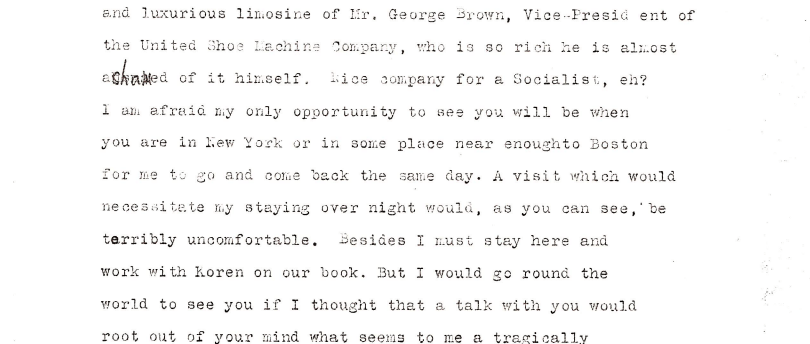Letter from John Macy to Helen Keller regarding Peter Fagan
1/9/20244 min read


In 1917, John Macy wrote a letter to Helen Keller reassuring her that she needed not to apologize for her love for and engagement with Peter Fagan. Here's the original text in the letter:
4 Newbury St, Boston, July 25, 1917.
My dear Helen:
Your letter came this morning. I cannot let the day pass without sending you a line. I know the country where you are, for I spent part of the last two summers at Dorset which is just south of you. The last time I was at Lake St. Catherine, I was in the distinguished company and luxurious limosine of Mr. George Brown, Vice-President of the United Shoe Machine Company, who is so rich he is almost ashamed of it himself. Rice company for a Socialist, eh? I am afraid my only opportunity to see you will be when you are in New York or in some place near enough to Boston for me to go and come back the same day. A visit which would necessitate my staying over night would, as you can see, be terribly uncomfortable. Besides I must stay here and work with Koren on our book. But I would go round the world to see you if I thought that a talk with you would root out of your mind what seems to me a tragically mistaken conception of yourself and your relations with Fagan. Let me try to write what I mean.
You speak of a confession and of a "blot" on your life. Why should you burden your soul with such hideously immoral nonsense? Himmel und Erde! It is no crime to love a man, even if he is the poorest thing that ever walked on two legs, and it is no crime to want a man even if you are not smitten with what you call true love. What is true love? You may search the sages and poets in vain for an answer. And no instinct or emotion or judgment within yourself ever tells you certainly whether true love has happened to you or not. All you know is that you want something or somebody like the very devil, and usually you don't get what you want. It is painful and tragic , but it is no sin; if it is, then the Almighty is an idiot. As for lying, no fellow in love, unless he is a fool, ever tells the truth, especially to old people whose fires are burned out, who are like dyspeptics sickened at the sight of a husky young person devouring vast quantities of food or looking at it, if it is forbidden, with longing eyes. It is right and natural, and I think in the long run not bad for your health and spirit, to suffer agonies of desire and disappointment. That kind of excruciation we all have to endure sooner or later. But it is not right or intelligent to blame yourself, and think you have disgraced yourself when you haven't. You ask me to forgive you. For what, my dear? The one thing I will not forgive you for is for adding to your suffering by piling upon your heart a lot of moralistic junk. You hope, you say, that some day I will answer a lot of questions that torment you. I will if I can find the answer in the depths of my infinite unwisdom. Here is one answer to a question you are probably asking yourself, though you do not put it to me directly. How much have you missed? Suppose your lover had been a first rate man, whose stock was worth propagating, how much would you have lost in losing him? Answer: much valuable experience (though what it is valuable for I don't know), a little joy and a hell of a lot of trouble. That is not my answer nor is it in any way a reflection of my personal difficulties. It is the answer that your Teacher or your Mother or any woman who has been through the game will give you if she looks back on her life honestly and sizes it up with candor and clearness. It is the answer that many women have written, and more would have written if it had been the habit of women to speak out what they really think. I have often thought of you with a child fathered by a fairly sound and decent man. A woman is not complete until she has been loved. That's a biological fact and there is no getting round it. But here is another fact, physiological and psychological, that the vitality of an unmated woman finds outlet in other ways, which are good for her and for other people, especially if she has a fiser(?) intelligence to work with, as you have. The world has been blessed by admirable spinsters from St. Catharine to Dr. Montessori, who have produced something more rare and more difficult to produce than children. Of course St. Catharine made the fatal mistake of getting beheaded for her belief when she was quite young, and I hope you will not follow her example, though you have shown signs of wishing to be a martyr to Socialism or some other holy cause. This is the end of today's lesson. Before you come to class next time please read ten chapters of Ellen Key’s “Liebe und Ehe”. She is a woman and knows more than a mere man.
Yours ever affectionately,
John
